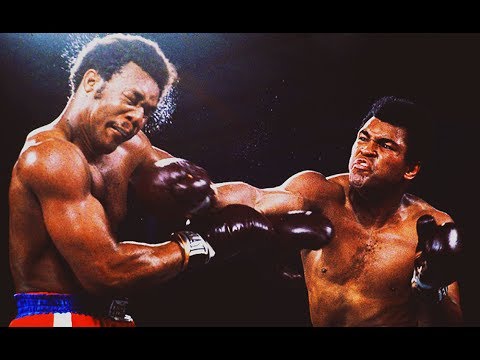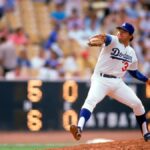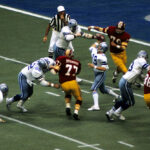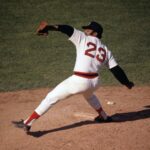45 Years Ago: The Rumble in the Jungle
While the greatest victory of Muhammad Ali’s career was perhaps over the U.S. Government, it could certainly be argued that he had no greater win in the boxing ring than his victory over George Foreman in the Rumble in the Jungle 45 years ago on October 30, 1974.

Though the 32-year old Ali had been a great champion, he had lost more than three years at the peak of his career due to his battle with the U.S. Government and in the three years since his return to the ring had never quite reached the level of greatest displayed earlier in his career.
He had posted a 15-2 record since returning to the ring and avenged both defeats, but the undefeated 25-year old Foreman was 40-0 in his career and wasn’t just winning fights, he was demolishing opponents.
Ali’s two defeats had been to Joe Frazier and Ken Norton. Foreman’s fights with both Frazier and Norton ended in the second round. He knocked Frazier down six times before their fight was finally stopped. Norton, who had famously broken Ali’s jaw in their first fight, was knocked out by Foreman in the second round.
There are many things about the Rumble in the Jungle that are now famously part of boxing lore.
One thing that made the fight notable was that it was being fought in Zaire, Africa. Ali had fought oversees several times previously, but never in Africa.
Also, it was the first major fight promoted by Don King. He would, of course, become known for creating boxing spectacles, but the Rumble in the Jungle would be the first exposure for many to the flamboyant King.
The fight was originally set for September 25th, but Foreman suffered a cut while sparing less than 10 days before the fight and they were forced to postpone for more than a month.
Though the extra time allowed Foreman to heal, it actually worked in Ali’s favor as he spent much time with the people and was embraced by local residents while Foreman was not happy with the surroundings.
The term “Ali, bomaye” (Ali kill him) became a popular chant by the locals and when the fight finally happened the atmosphere was clearly an advantage for Ali.
Many expected Foreman to make short work of Ali and he indeed connected on some big punches in the early going of the fight. That Ali didn’t go down became a key part of the story.
Eventually, Ali realized that for him to win he needed to wear down his younger and powerful opponent. Though he had used the strategy unsuccessfully in his losses to Frazier and Norton, the “rope-a-dope” strategy of staying against the ropes and bracing for big punches became part of the strategy for Ali.
Foreman was still able to get in some huge punches, but eventually he started to tire and Ali began to gain control of the fight.
According to Foreman, Ali started talking to him saying things like “They told me you could punch, George!” But Foreman still believed he was in control until the seventh round when he landed a big punch and Ali responded by saying ‘That all you got, George?’
As it happened, that was all he had and in the eighth round Ali landed a flurry of punches that knocked Foreman out.
While the upset was certainly different than when Buster Douglas defeated Mike Tyson in 1990 because Ali was a former champion, it was very similar in terms of the shockwaves sent across the boxing world.
Few believed Ali could win and it immediately changed the perception of the man who had been calling himself the “Greatest of All-Time” since before he had ever won the title.
Ali became just the second person to regain the Heavyweight title and won his next 10 defenses, including winning the third fight against both Frazier and Norton. After losing to Leon Spinks in 1978, Ali would regain the title in a rematch to become the first person to win the Heavyweight title three times.
After the loss, Foreman did not fight again for more than 14 months and while he won his next five fights, was no longer seen as invincible. He never got another chance at Ali and lost a 12-round decision to Jimmy Young in March 1977.
Though only 28, Foreman did not fight again for an entire decade. He did eventually return to the ring and went 33-3 in fights over the next decade before retiring for good in 1997. On November 5, 1994, just over 20 years after losing to Ali, Foreman defeated Michael Moorer to win the IBF and WBA Heavyweight titles.
There seems little doubt that had the results of the Rumble in the Jungle been different, the eventual perception of both fighters would also have been significantly different.
Had Ali lost to Foreman, though he was only 32 years old, his days as a champion contender would likely have been over. He would have still gone down as a great fighter, but his career narrative would have probably been more about the three and a half years he lost in his boxing prime instead of his resurgence in the 1970s. He certainly would not have been selected the third greatest athlete of the 20th Century by ESPN.
The first iteration of George Foreman was strictly known as a dominant boxer. When he returned for his second career in the ring his flamboyant personality made him a national phenomenon and pitch-man. If he had continued a dominant boxing run in the 1970s it is very likely that he would not have returned later in life and become such a well-known personality.
Below are links to some YouTube videos of the fight.













